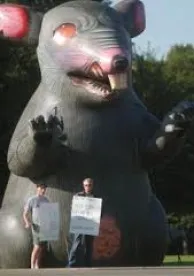Most business owners would shudder at the thought of rats being on their premises, but one rat is particularly unwelcome to employers – “Scabby the Rat.” This red-eyed, rather vicious looking rat-shaped balloon (sometimes as tall as 25 feet) has become a symbol used by labor unions across the country to publicize that they have a dispute with an employer.
No stranger to the courts, Scabby has been the subject of many legal challenges from the business and property owner communities. Nonetheless, in 2011, the National Labor Relations Board held that labor unions’ use of Scabby during strikes and protests is permissible. Other cases have firmly held that unions’ deployment of Scabby in labor disputes is a form of speech protected by the First Amendment.
Thus, the United States Court of Appeals for the Seventh Circuit’s February 14, 2019 decision in Construction and General Laborer’s Union No. 330 v. Town of Grand Chute, Wisconsin, which affirmed a Wisconsin town’s prohibition of a union’s use of Scabby, came as a surprise (and undoubtedly ruined the union’s Valentine’s Day). In its decision, the Court acknowledged the First Amendment’s protection of Scabby, but nonetheless found that the town’s prohibition of the union’s use of Scabby during a labor protest based on Scabby’s non-compliance with a local sign ordinance did not violate the union’s protected speech rights.
In the case, Local 330 was engaged in a dispute with a Toyota car dealership in Grand Chute, Wisconsin. The dealership had hired a masonry contractor to perform some work; the union alleged that the contractor did not pay standard area wages and benefits to its employees. To show its displeasure with the dealership’s doing business with the masonry contractor, the union picketed in the public area near the dealership and installed a 12-foot Scabby balloon by means of tethers staked into the ground in the median across the road from the dealership. Grand Chute’s code enforcement officer subsequently ordered the union to remove Scabby because it violated the town’s sign ordinance, which prohibited all private signs on public roads or right-of-ways.
Under the First Amendment, a government can restrict speech in a public forum if the restriction is content neutral, is narrowly tailored to serve a significant governmental interest, and leaves open ample alternative ways to communicate the desired message. Applying this standard, the Seventh Circuit found that Grand Chute’s sign ordinance, and its enforcement of that ordinance, passed muster under the First Amendment because it banned all private signs on public roads, regardless of the content, was implemented in order to protect visibility and, therefore, the important interest of public safety. (Although not specifically addressed in its opinion, the court most likely also concluded that the sign ordinance was permissible because, despite the Scabby-ban, the union could still express its protest through other methods of communication.) The union argued that despite these factors, application of the sign ordinance to bar its use of Scabby was impermissible because the town’s code enforcement officer was selective in his enforcement of the ordinance and did not prohibit all types of speech that fell under its purview. However, the court found that the union failed to prove that the code enforcement officer had allowed other ordinance violators’ signage on public property to remain in place, while ordering others to be removed. Instead, it concluded that the officer’s enforcement was uniform and followed the code provision. Accordingly, the Court concluded it did not have evidence of selective, content-based enforcement of the ordinance. Based on this finding, the court held that the town’s order that the union remove Scabby from the protest site on the public right-of-way did not violate the union’s First Amendment rights.
Although Scabby was sent packing in this case, by no means does the outcome here suggest that we have seen the last of him. It does however mean that in certain circumstances, a union’s use of the giant inflatable rat may be limited by legitimate interests that override the free speech considerations that attend a union’s use of Scabby to publicize a labor dispute.




 />i
/>i

